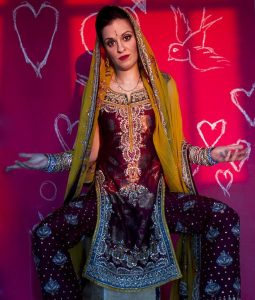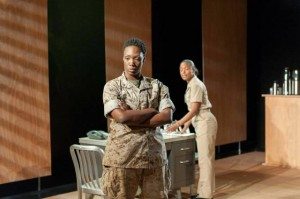

On April 3rd and 4th the South Asian Women’s Creative Collective (SAWCC) held its bi-annual literary festival titled Emerge: New Mediums, New Voices at the Asian American Writers Workshop. Staying true to the title, the festival featured a range of South Asian women from essayists, and bloggers to novelists and playwrights.
“Literary festivals always have the connotation of traditional novelists, and we wanted to really puncture that notion with those doing amazing work in other mediums,” said Ambika Samarthya-Howard, festival co-organizer.
Throughout the festival, the representation of South Asians, specifically South Asian women, in popular culture presented itself as the primary point of discussion and debate.
“I think these voices are particularly important, as they are repeatedly marginalized, not just in the mainstream society, but in the art world too,” said Aaliya Zaveri, festival co-organizer.

As conversations around diversity and emergent markets for television and have begun to surface, the SAWCC Literary Festival marked an important moment, one in which women from traditional and non-traditional mediums spoke about their experiences about being artists in the current artistic landscape.
The two playwrights highlighted within the festival, Rehana Lew Mirza and Nadia Manzoor, have been telling stories across mediums for years. I spoke to them about identity politics, minority representation in popular media, and how their own personal histories inform their work.
While each writer took a different path, both were influenced by growing up in an immigrant home. Manzoor, whose one woman show Burq Off has received critical acclaim and run to sold-out shows around the world, said she started journaling at a young age about “the cultural yoyo” that was her life. Mirza discovered her calling early in high school and studied Dramatic Writing at NYU and then pursued her MFA in Playwrighting at Columbia. And while her parents weren’t always supportive, she said, “their opposition only made her realize the depth of her passion for the arts.”
Both playwrights were also inspired by the lack of diversity in the theatre community. Mirza claimed that the industry doesn’t “reflect the world we live in today.” After graduating from NYU, she started one of the first South Asian theatre companies in New York as a way to disrupt what she referred to as a “comfort level with the current state.”
“There’s a lot of ‘othering’ going on right now with how South Asians are being portrayed…there’s a tendency to have just one story represent a large and diverse group. I think there’s room for more than one black play or Latino play or South Asian play,” said Mirza. Her latest play, Soldier X, features Muslim American, African American and Chinese American characters.
Manzoor also hopes to add to the pantheon of emerging South Asian voices. As a Pakistani Muslim kid growing up in England, Manzoor struggled to find artists talking about the conflicts she experienced. Instead, she said, “the mainstream idea of a Muslim was polarized, lacking nuance and complications.”
“Pakistani men and women are definitely under-represented and there aren’t enough moderate Muslims telling their stories,” she added.
While her own one-woman show furthered the discourse, Manzoor cautioned, “I’m one story, I’m not the mouthpiece for a group of people.”

Both writers have come to appreciate the burden and privilege of being a South Asian female artist.
“I try not to think too much about the labels,” said Mirza. “They do have something to do with my perspective on the world, but they don’t limit the kind of stories I want to tell.”
While the festival put front and center the myriad of challenges encountered by women of color as they attempt to tell their stories, no matter what the medium, it also celebrated just how women like Mirza and Manzoor are pushing against established notions of which voices are worthy of inclusion.
Manzoor reflected on just how far women have come when she reminisced about a time that as a young person she didn’t have “access to community, a forum where women can deeply identify with each other.”
At the festival, that access was created as Manzoor taught a workshop where a group of women, some first-time writers, others more seasoned, sat and debated on how they could make their work more relatable and less ethnic.
Beyond the panel discussions and the musings on identity politics and debate around representational duties and burdens, SAWCC’s Literary Festival, and its esteemed panelists, including Mirza and Manzoor, took a much-needed step in re-enforcing the idea that minorities’ stories, stories told by women, are universal.
You can find out more about Nadia Manzoor’s one-woman show Burq Off at https://nadiapmanzoor.com. The second season of her web-series “Shugs & Fats” premieres on April 13. Rehana Lew Mirza’s Soldier X, presented by Ma-Yi Theater Company, is currently running at the Here Arts Center.